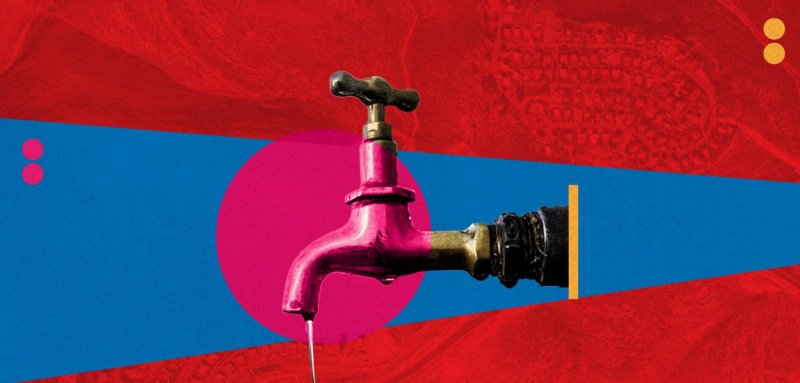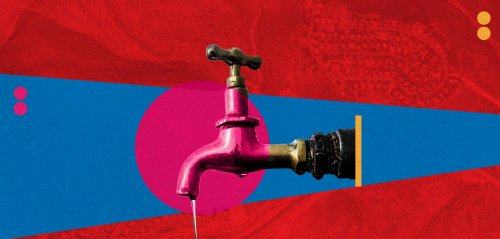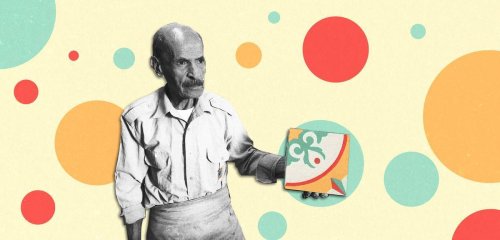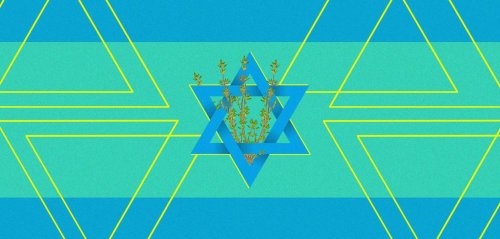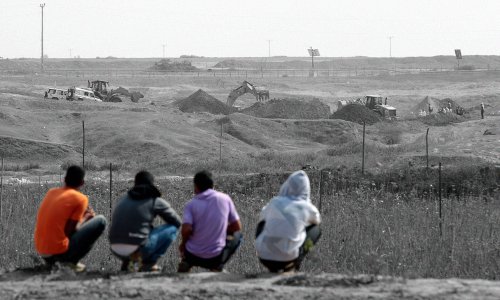Most cities in the West Bank suffer from water cuts for several days at a time, especially in the summer. This is due to the occupation imposing its control over the groundwater in the West Bank and limiting the quantities that are allowed to be used, not to mention poor distribution and widespread inappropriate consumption. The city of Ramallah, in particular, suffers from severe water shortages due to the influx of a large number of visitors from other cities, being the tourist capital of the West Bank. The town of Beitunia suffers from severe water shortages, with the routine water cuts there sometimes going on as long as ten days. According to the available statistics, an individual needs, according to normal rates, about one hundred liters of water, while Israel allows only 30 to 40 liters per day.
Not Because It’s a Wasteland
If we pass through the community gatherings of al-Hadidiyah near Tubas, in Palestine’s Jordan Valley, one can see the barren land stretching along the road, not because it is a waste land, but because of the frequent lack of water and scarcity. But on the horizon, a dense green oasis can be seen adjacent to that area; the settlement of Ro'i, which is inhabited by settlers who take most of the water, thus depriving Palestinians of water meant for drinking, irrigating crops, and watering livestock, which portrays the clear bigotry and prejudice being practiced when it comes to water sources and its distribution.
At the same time, the town of ad-Dhahiriya in the Hebron district suffers from severe water shortages, with the average daily consumption per capita being reduced to thirty liters. But on the other hand, we find multiple Israeli settlements on the outskirts of the town, such as the settlements of “Beit Yatir”, “Shim’a”, and “Adora”, where the per capita share reaches 550 liters of water, and it is no secret to anyone the luxury that the settlers live in amidst their dense green gardens, while the Palestinians hardly get any access to water.
Recreation and Swimming Pools
The Israelis were not satisfied with just stealing and dominating the land, but also were able, with time, to control the resources of the land as well, as they are in control of the maps for operating and investing water throughout the Palestinian territory. It is not a matter of being in charge of organization alone, but also of proving their ability to have complete control over the sources of water and living, as settlers consume water from the West Bank, not only for bathing, drinking and the like, but also for pumping it into their swimming pools and recreational ponds.
It is no secret to anyone the luxury that the settlers live in amidst their dense green gardens, while the Palestinians hardly get any access to water
The Israeli occupation operates under the concept brought forth by the well-known Arab saying: “Me, and after me, the flood!”. This arrogance, which seems to be the farthest thing from the concept of civilization, prevents water in even the smallest amounts from those who actually need it, by controlling the underground wells dug with the money of the Palestinians - around which settlements have been established - along with preventing Palestinians from digging new wells.
The percentage of groundwater pollution in West Bank cities, in addition to the high levels of nitrates in them, has increased due to excessive use of settlements established on Palestinian land. In the city of Tulkarm, for example, the amount of water that “escaped” from pollution, does not exceed 27% at best, while in Qalqilya governorate, it amounted to only 23%.
As a result, the Palestinians are now in trouble with regard to water, as their suffering is constantly increasing, due to the increase in the population in the West Bank, while the occupation maintains a fixed percentage of water that Palestinians can obtain, which means that the share of water per person is constantly decreasing.
Dr. Nadia Sawafneh tells Raseef22, “Most villages in the West Bank get very little water, which endangers the health and lives of citizens, in light of the urgent need for cleanliness, hygiene, drinking, and to irrigate the land and crops.”
The doctor goes on to say, “Obtaining water through mobile tankers (pulled) by cars, where there is noise and congestion on the roads, along with water cuts for long periods of time, is a great hardship for the people of the villages, and these tanks cause major health problems for the population due to the lack of the minimum means of sterilization, and in many cases, germs and microorganisms are transmitted through this primitive transport process.”
She continues, “We are receiving cases of kidney failure and liver contamination, because the water that many residents in the West Bank drink is contaminated with nitrates and chloride. The Palestinian citizens are caught between water pollution and its scarcity. Also, there are many families who do not have access to desalinated or mineral water, as most of the cases we receive have relied on drinking water that has been contaminated by the unjust practices of settlers.”
Gangs
The Israeli occupation and its settlers have decided to take over the Palestinian lands in the West Bank through illegal means, by building streets in the middle of Palestinian farms without any legal basis, in order to isolate the farms from each other and prevent Palestinians from traveling through these streets. They have also relied on intimidating and attacking Palestinian citizens to expel them from their lands and control groundwater sources.
Speaking on this to Raseef22, engineer Khalil al-Tawalibi indicates that, “Palestinian cities in the West Bank have been suffering from a water crisis for many years, due to the occupation’s piracy and control of groundwater, as each Palestinian is prohibited from obtaining his daily share of water, while the settlers waste the excess quantities granted to them, and needlessly spill them onto the ground in plain sight.”
We are receiving cases of kidney failure and liver contamination, because the water that many residents in the West Bank drink is contaminated with nitrates and chloride
Al-Tawalibi carries on, “The occupation gives us the minimum amount of life and living, and it does that with water as well. The Palestinians have no right to invest in agriculture in the lands surrounding the settlements across vast areas. They are trying to kill the land surrounding the settlements in every way they can, while turning the lands they have stolen into a green paradise. A person can even easily distinguish the land owned by the Palestinians from the land that the settlers stole. It’s an astonishing sight.”
He adds, “A year ago, I brought workers to cultivate my land in the district of the village of Herbat al-Nabi, which is somewhat far from the Israeli settlement of Beit Yatir, and after we were able to plant plum, almond, and citrus trees, we noticed the scarcity of the water in the place, and that it began to be unjustifiably cut off. We tried to reach out to Palestinian officials about this, but they told us that things weren’t going normally, and that the amount of available water is very limited, and that this is the extent that the occupation allowed us to use. We later discovered that the settlers know the source of the water network that was given to us, and that they control the flow depending on their mood, since they can also withhold it from us whenever they want to.”
Al-Tawalibi continues, “One night we were surprised by the settlers suddenly attacking our land. They broke and damaged all the belongings in it, along with a lot of trees, then smashed the water dispensers in the land. The guard could not stop them because they threatened to kill him.”
The Land... Their Identity
While the land represents the identity of the Palestinian, who defends it with his blood and his life, and preserves its resources and groundwater, it represents nothing more than spoils to the settler, spoils that he has plundered, and he wants to benefit from its privileges in the shortest possible time, without any concern for its future.
On this, farmer Hussein al-Saifi recounts to Raseef22, “I am a farmer, after my father and grandfather. I grew up among the trees, and I used to name the trees by our names when I was a child. My father was proud of his profession, and he taught me that cultivating the land expels the occupier, and that keeping it empty and barren means one thing: that you are dead.”
The Palestinians have no right to invest in agriculture in the lands surrounding the settlements for vast areas. They are trying in every way to kill the land surrounding the settlements, while turning the lands they have stolen into a green paradise
Al-Saifi goes on to tell us, “In 1996, we noticed a strange movement from the settlers in the areas around our farms, and after we went to check, we found out their intention to establish a settlement on a large area of Palestinian dunams. At that time, my father told me that this land is our fort and stronghold, and we will not leave it even if it costs us our lives.”
He then adds, “After a while, unruly Israeli settlers started raiding our farm under the pretext of wanting to drink water, and I kept glimpsing malicious looks in their eyes. My father and I would counter them under the excuse that there was no water, so they would go and drink water from their cars right in front of our eyes.”
The Nabulsi farmer continues, “The settlement of Giv’ot Olam was established nearby on a large area of the (Palestinian) land, and began producing a large stockpile of chicken eggs on a daily basis. The problem is that since its establishment, water has started to become scarce on our farm and the surrounding areas, and the priority went to them when it came to owning and disposing of the water. With time, we began to feel the danger to our trees after the water level fell to zero at the height of summer. We found ourselves heartbroken over our trees that we were watching wither and die from thirst before our very eyes, without having any way to solve this problem. Because of this despair, my father's health gradually worsened, and he fell just like his trees fell. He could not bear to see the fruits of his entire life’s work and his trees waste away without being able to save them.”
Al-Saifi concludes his story, saying, “My father died, and the state of the land worsened further, but I resolved to continue on the path, and stand fast in the face of the settlers and their oppression. I worked as hard as I could to take care of the trees no matter what happened, and I planted trees with rain-fed fruits in different places of the farm. Since then, I have resolved to stay on my land and take care of the trees no matter what it costs me. Many times, I had to buy water through tankers to avoid having the trees die. I still evade death, as my father once described it to me. As long as I am alive, my land won’t turn into a wasteland, and I am teaching this to my children.”
Raseef22 is a not for profit entity. Our focus is on quality journalism. Every contribution to the NasRaseef membership goes directly towards journalism production. We stand independent, not accepting corporate sponsorships, sponsored content or political funding.
Support our mission to keep Raseef22 available to all readers by clicking here!
Interested in writing with us? Check our pitch process here!
